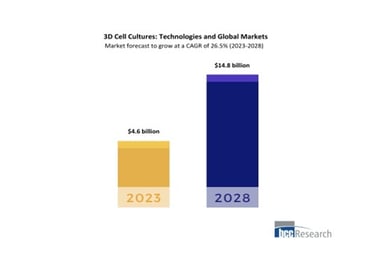
Mar 12, 2024
Blog Life Sciences The Impact of 3D Cell Cultures on Global Markets
In the domain of innovative technologies, the 3D cell culture market, illuminated in the extensive study "3D Cell Cultures: Technologies and Global Markets," emerges as a beacon of innovation, poised for exponential growth and transformative impact. With escalating demand in drug discovery, disease modeling, and regenerative medicine, the market's trajectory reflects a landscape ripe with opportunities for advancement. The inherent superiority of 3D cell culture models over traditional 2D counterparts lies in their ability to faithfully replicate the intricate three-dimensional structures and cell-cell interactions observed in living tissues, offering a more accurate and predictive representation of human biology. This fidelity extends to the study of complex diseases, where 3D models excel in capturing the nuances of conditions that elude facile modeling in 2D culture systems. For instance, 3D liver spheroids enable nuanced exploration of liver diseases, while 3D brain organoids offer unprecedented insights into brain-related disorders. Bolstered by projections from BCC Research’s comprehensive study, which forecasts a meteoric rise from $4.6 billion in 2023 to a staggering $14.8 billion by 2028, boasting a remarkable compound annual growth rate (CAGR) of 26.5%, the 3D cell culture market emerges as a transformative force shaping the future of advanced technologies.

3D cell cultures represent a sophisticated method for cultivating and analyzing cells within a three-dimensional framework, replicating the intricate conditions found within the human body. Their utility spans across various realms of biomedical inquiry, including cancer research, stem cell studies, tissue engineering, and drug development. Several pivotal factors propel the growth of the 3D cell culture market:
Government regulations and mandates: In numerous countries worldwide, governments have enacted regulations and guidelines aimed at minimizing or substituting the use of animals in scientific experiments, particularly for assessing the safety and effectiveness of drugs and cosmetics. The adoption of 3D cell cultures presents a promising alternative approach capable of delivering more precise and ethical outcomes compared to traditional animal models. Notably, the European Union implemented a ban on animal testing for cosmetic products in 2013, marking a significant milestone in promoting alternative testing methods. Similarly, the U.S. Food and Drug Administration (FDA) has endorsed the utilization of 3D cell cultures and organ-on-a-chip technologies for drug testing purposes, emphasizing the importance of embracing innovative methodologies to enhance regulatory compliance while prioritizing animal welfare.
Rising demand for tissue engineering: Tissue engineering, encompassing the fabrication of functional tissues or organs from living cells, biomaterials, and growth factors, has garnered increased attention due to its potential to address the persistent shortage of organ donors and provide innovative treatments for various diseases and injuries. Within this landscape, 3D cells cultures emerge as indispensable tools, offering a versatile platform for supporting cell attachment, differentiation, and proliferation. By mimicking the physiological and mechanical attributes of native tissues, such as vascularization and nutrient supply, 3D cells cultures hold immense promise in advancing tissue engineering endeavors, fostering the development of more effective therapies and medical interventions.
Advancements in healthcare technology: The continuous evolution of healthcare technology has facilitated the emergence of sophisticated and lifelike 3D cell culture models, propelled by an array of innovative methodologies and techniques. From scaffold-based and scaffold-free approaches to bioreactors, microfluidics, bioprinting, and organoids, these advancements enable the generation of 3D cell cultures with heightened complexity, functionality, and scalability. For instance, bioprinting technologies enable the precise fabrication of 3D structures with spatial control and diverse cell compositions, while organoids replicate the organ-specific characteristics and functionalities of human tissues with remarkable fidelity. Such technological strides not only enhance the accuracy and reliability of experimental models but also pave the way for transformative developments in drug discovery, disease modeling, and regenerative medicine.
The global market for 3D cell culture is estimated to increase from $4.6 billion in 2023 to reach $14.8 billion by 2028, at a compound annual growth rate (CAGR) of 26.5% from 2023 through 2028.
InSphero: A leading provider of 3D in vitro models, InSphero delivers dependable, scalable, and reproducible 3D cell culture models tailored for liver safety, liver disease, islet biology, oncology, and immunology research. InSphero's portfolio also includes innovative bioprinting and organ-on-a-chip technologies, facilitating precise and controlled placement of cells and biomaterials within intricate 3D structures.
MatTek Corporation: Renowned for its innovative biotechnology solutions, MatTek specializes in crafting 3D reconstructed human tissue models sourced from primary human cells, catering to both clinical and pre-clinical research endeavors. MatTek further offers an array of supplementary products and services, encompassing cell culture dishes, primary human cells, and media, 3Diy kits, and testing services, catering to diverse applications across cosmetics, chemical, pharmaceutical, and household product industries.
Corning Incorporated: A pioneering force in materials science technology, Corning boasts expertise in specialty glass, ceramics, and associated materials and technologies, including advanced optics. In addition to its core offerings, Corning provides a comprehensive suite of products and solutions tailored for life science research and bioproduction needs. This includes a diverse range of cell culture vessels, microplates, flasks, bioreactors, and cell culture media, empowering researchers and bioproduction facilities with innovative tools and resources.
PerkinElmer: As a prominent figure in life science and diagnostics solutions worldwide, PerkinElmer specializes in delivering innovative products and services for 3D cell culture imaging and analysis. Their offerings include high-resolution imaging solutions tailored for advanced research needs across diverse domains, including cancer, stem cell research, tissue engineering, and drug discovery. PerkinElmer also facilitates high-throughput drug screening within 3D cell cultures through the integration of bioprinting and organ-on-a-chip technologies, empowering researchers with innovative tools to drive scientific progress.
Promega Corporation: Promega Corporation is a prominent biotechnology company based in the United States, renowned for its groundbreaking contributions to the life science research sector. Within the 3D cell culture market, they excel in providing innovative solutions and comprehensive technical support. Their flagship product, the CellTiter-Glo® 3D Cell Viability Assay, stands out for its unparalleled accuracy and efficiency in measuring cell viability within 3D cultures, offering researchers a reliable tool for advancing their studies in this dynamic field.
3D cell cultures are a rapidly growing field of biomedical research that offers various advantages over conventional 2D cell cultures, such as improved physiological relevance, tissue complexity, and drug response. 3D cell cultures have applications in various domains, such as cancer, stem cells, tissue engineering, and drug development. The market of 3D cell cultures is driven by factors such as government regulations and mandates, rising demand for tissue engineering, and advancements in healthcare technology. According to a report by BCC Research, the global market for 3D cell cultures is expected to reach $14.8 billion by 2028, at a compound annual growth rate (CAGR) of 26.5% from 2023 through 2028. The 3D cell culture market is highly competitive and dynamic, with several key players offering innovative products and solutions to meet the diverse needs of researchers and clinicians. 3D cell cultures are poised to revolutionize the field of biomedical research and pave the way for a new era of personalized medicine.
Consider becoming a member of the BCC Research library and gain access to our full catalog of market research reports in your industry. Not seeing what you are looking for? We offer custom solutions too, including our new product line: Custom Intelligence Services.
Contact us today to find out more.

Kavita Rawat is a Marketing Operations Executive at BCC Research, with a master’s degree in business. She specializes in optimizing marketing strategies and content creation. With her MBA, she combines her passion for marketing with her academic prowess to drive success in the ever-evolving field.
In today’s fast-paced biomedical world, researchers and pharmaceutical companies...

Radiopharmaceuticals represent a cutting-edge frontier in modern medicine, offer...

Implantable Remote Patient Monitoring (IRPM) devices are revolutionizing healthc...

We are your trusted research partner, providing actionable insights and custom consulting across life sciences, advanced materials, and technology. Allow BCC Research to nurture your smartest business decisions today, tomorrow, and beyond.
Contact UsBCC Research provides objective, unbiased measurement and assessment of market opportunities with detailed market research reports. Our experienced industry analysts assess growth opportunities, market sizing, technologies, applications, supply chains and companies with the singular goal of helping you make informed business decisions, free of noise and hype.